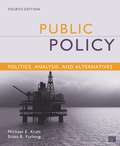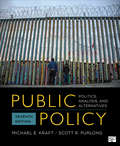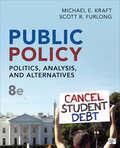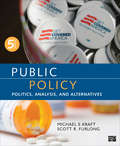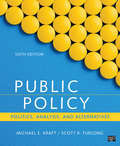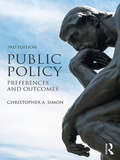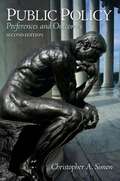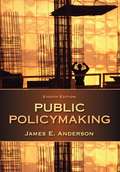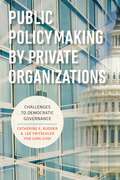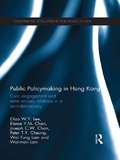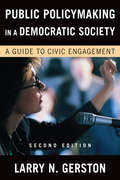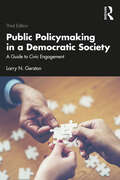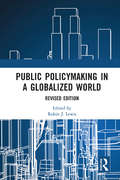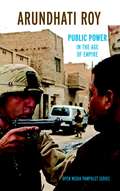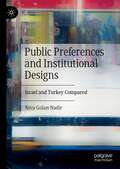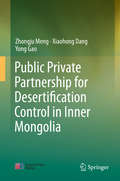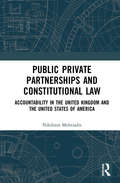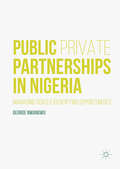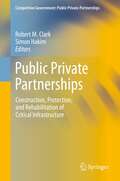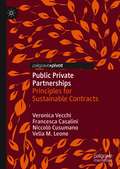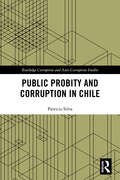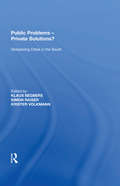- Table View
- List View
Public Policy: Politics, Analysis, And Alternatives, 4th Edition
by Michael E. Kraft Scott R. FurlongAll too often, public policy textbooks offer a basic grounding in the policy process without the benefit of integrating the use of policy analysis. Kraft and Furlong, since their first edition, take a different tack. They want students to understand how and why policy analysis is used to assess policy alternatives-not only to question the assumptions of policy analysts, but to recognize how analysis is used in support of political arguments. To encourage critical and creative thinking on issues ranging from the financial bailout to rising gas prices to natural disasters, the authors introduce and fully integrate an evaluative approach to policy. Public Policy starts with a concise review of institutions, policy actors, and major theoretical models. The authors then discuss the nature of policy analysis and its practice, and show students how to employ evaluative criteria in six substantive policy areas. Public Policy arms students with analytic tools they need to understand the motivations of policy actors-both within and outside of government-influence a complex, yet comprehensible, policy agenda. Enhancements to the 4th edition: - All chapters have been comprehensively updated to include recent events, issues, and policy debates including the conduct of the wars in Afghanistan and Iraq, the use of private contractors for military support and operations, the rising cost of gasoline and disputes over energy policy and climate change, the controversy over immigration policy, requirements for financial regulation, heightened concerns over economic and social inequality, and the clash over reforming taxes and entitlement programs, as well as dealing with the federal deficit and national debt. - New and updated working with sources and steps to analysis features help students investigate sources of information and apply evaluative criteria. - New and updated end-of chapter discussion questions, suggested readings, and web sites.
Public Policy: Politics, Analysis, and Alternatives
by Michael E. Kraft Scott R. FurlongWith the right information, we can develop public policies that work better. All too often, public policy textbooks offer a basic grounding in the policy process without the benefit of integrating the use of policy analysis. Michael E. Kraft and Scott R. Furlong take a different tack. Public Policy: Politics, Analysis, and Alternatives, Seventh Edition helps students understand how and why policy analysis is used to assess policy alternatives. The text encourages them to not only question the assumptions of policy analyst, but also recognize how these strategies are used in the support of political arguments. The authors introduce and fully integrate an evaluative approach to policy to encourage critical and creative thinking on issues ranging from health care to climate change. From a concise review of institutions, policy actors, and major theoretical models to a discussion of the nature of policy analysis and its practice, Kraft and Furlong show students how to employ evaluative criteria in six substantive policy areas. Students come away with the analytic tools they need to understand that the motivations of policy actors—both within and outside of government—influence a complex yet comprehensible policy agenda.
Public Policy: Politics, Analysis, and Alternatives
by Michael E. Kraft Scott R. FurlongWith the right information, we can develop public policies that work better. All too often, public policy textbooks offer a basic grounding in the policy process without the benefit of integrating the use of policy analysis. Michael E. Kraft and Scott R. Furlong take a different tack. Public Policy: Politics, Analysis, and Alternatives, Seventh Edition helps students understand how and why policy analysis is used to assess policy alternatives. The text encourages them to not only question the assumptions of policy analyst, but also recognize how these strategies are used in the support of political arguments. The authors introduce and fully integrate an evaluative approach to policy to encourage critical and creative thinking on issues ranging from health care to climate change. From a concise review of institutions, policy actors, and major theoretical models to a discussion of the nature of policy analysis and its practice, Kraft and Furlong show students how to employ evaluative criteria in six substantive policy areas. Students come away with the analytic tools they need to understand that the motivations of policy actors—both within and outside of government—influence a complex yet comprehensible policy agenda.
Public Policy: Politics, Analysis, and Alternatives
by Michael E. Kraft Scott R. FurlongWith the right information, we can develop public policies that work better. Public Policy: Politics, Analysis, and Alternatives, Eighth Edition helps students understand how and why policy analysis is used to assess policy alternatives. The text encourages them to not only question the assumptions of policy analysts, but also recognize how various strategies are used in support of political arguments.
Public Policy: Politics, Analysis, and Alternatives
by Michael E. Kraft Scott R. FurlongWith the right information, we can develop public policies that work better. Public Policy: Politics, Analysis, and Alternatives, Eighth Edition helps students understand how and why policy analysis is used to assess policy alternatives. The text encourages them to not only question the assumptions of policy analysts, but also recognize how various strategies are used in support of political arguments.
Public Policy: Politics, Analysis, and Alternatives
by Scott R. Furlong Mr Michael E. KraftSince the first edition of Public Policy: Politics, Analysis, and Alternatives, Michael Kraft and Scott Furlong have taken a different tack. They want students to understand how and why policy analysis is used to assess policy alternatives—not only to question the assumptions of policy analysts, but also to recognize how analysis is used in support of political arguments. To encourage critical and creative thinking on issues ranging from the federal deficit to health care reform to climate change, the authors introduce and fully integrate an evaluative approach to policy. The authors begin the fifth edition of Public Policy with a concise review of institutions, policy actors, and major theoretical models. Then, they discuss the nature of policy analysis and its practice and show students how to employ evaluative criteria in six substantive policy areas. The text arms students with the analytic tools they need to understand the motivations of policy actors—both within and outside of government—and to influence a complex, yet comprehensible, policy agenda.
Public Policy: Politics, Analysis, and Alternatives
by Scott R. Furlong Mr Michael E. KraftIn Public Policy: Politics, Analysis, and Alternatives, students come to understand how and why policy analysis is used to assess policy alternatives. To encourage critical and creative thinking on issues ranging from the federal deficit to health care reform to climate change, authors Michael Kraft and Scott Furlong introduce and fully integrate an evaluative approach to policy. The Sixth Edition of Public Policy offers a fully revised, concise review of institutions, policy actors, and major theoretical models as well as a discussion of the nature of policy analysis and its practice. Both the exposition and data have been updated to reflect major policy controversies and developments through the end of 2016, including new priorities of the Donald Trump administration.
Public Policy: Politics, Analysis, and Alternatives
by Scott R. Furlong Mr Michael E. KraftIn Public Policy: Politics, Analysis, and Alternatives, students come to understand how and why policy analysis is used to assess policy alternatives. To encourage critical and creative thinking on issues ranging from the federal deficit to health care reform to climate change, authors Michael Kraft and Scott Furlong introduce and fully integrate an evaluative approach to policy. The Sixth Edition of Public Policy offers a fully revised, concise review of institutions, policy actors, and major theoretical models as well as a discussion of the nature of policy analysis and its practice. Both the exposition and data have been updated to reflect major policy controversies and developments through the end of 2016, including new priorities of the Donald Trump administration.
Public Policy: Preferences and Outcomes
by Christopher A. SimonNow in a thoroughly revised third edition, Public Policy: Preferences and Outcomes is designed to help students enrolled in a public policy course discuss policy issues and understand the ways in which public policy is grounded in normative theory. This approachable book examines the role of political theory in the governance process and the effect of public opinion on policy priorities and government. It introduces students to the tools of policy analysis and the most up to date policy theories in conceptualizing public policy in several major policy areas. New to this edition: A thoroughly revised and updated chapter on public policy models, including new sections on the importance of science, pluralism, institutional analysis and development, multiple streams, the advocacy coalition framework, the punctuated equilibrium framework, policy diffusion, and the constructivist approach. New sections on health policy, welfare economics and the public good, the nuclear arms race, the War on Terrorism, the Quadrennial Defense Review, contemporary policing techniques and issues, and renewable energy. Restructured and rewritten sections on social policy and equality that includes sections on employment, LGBTQ rights and same sex marriage, the legalization of marijuana, and income inequality. Assuming no prior knowledge of the subject, and offering instructors a variety of ways to tailor the book to their classroom setting and course priorities, Public Policy: Preferences and Outcomes, 3e is a highly flexible and effective teaching resource for introductory public policy courses at the undergraduate level and also serves as an ideal refresher book for students at the graduate level.
Public Policy: Preferences and Outcomes (Second Edition)
by Christopher A. SimonBy combining normative and empirical perspectives, Christopher A. Simon's second edition of Public Policy encourages the next generation to of policy makers to think both practically and philosophically throughout the policy process. This second and heavily revised edition covers the historic background, political science, and philosophical values of public policy. Chapters conclude with a case study, engaging students in applying their theoretical knowledge in practical terms, and encouraging them to be informed and active citizens.
Public Policymaking
by James AndersonTo explain the fundamentals of public policy, this best-selling text focuses on the process behind the crafting of legislation. By examining the individual steps--from identifying a problem, to agenda setting, to evaluation, revision, or termination of a policy--students are able to see how different factors influence the creation of policy. Each chapter features at least one case study that illustrates how general ideas are applied to specific policy issues. This new Seventh Edition addresses the economic crisis as well as how the Obama administration differs from the Bush administration in its approach to policy making.
Public Policymaking by Private Organizations: Challenges to Democratic Governance
by A. Lee Fritschler Catherine E. Rudder Yon Jung ChoiHow private groups increasingly set public policy and regulate lives-with little public knowledge or attention.From accrediting doctors and lawyers to setting industry and professional standards, private groups establish many of the public policies in today’s advanced societies. Yet this important role of nongovernmental groups is largely ignored by those who study, teach, or report on public policy issues. Public Policymaking by Private Organizations sheds light on policymaking by private groups, which are not accountable to the general public or, often, even to governments.This book brings to life the hidden world of policymaking by providing an overview of this phenomenon and in-depth case studies in the areas of finance, food safety, and certain professions. Far from being merely self regulation or self-governance, policymaking by private groups, for good or ill, can have a substantial impact on the broader public-from ensuring the safety of our home electrical appliances to vetting the credit-worthiness of complex financial instruments in the run-up to the 2008 financial crisis.From nonprofit associations to multinational corporations, private policymaking groups are everywhere. They certify professionals as competent, establish industry regulations, and set technical and professional standards. But because their operations lack the transparency and accountability required of governmental bodies, these organizations comprise a policymaking territory that is largely unseen, unreported, uncharted, and not easily reconciled with democratic principles. Anyone concerned about how policies are made-and who makes them-should read this book.
Public Policymaking in Hong Kong: Civic Engagement and State-Society Relations in a Semi-Democracy (Comparative Development and Policy in Asia)
by Eliza W.Y. Lee Elaine Y.M. Chan Joseph C.W. Chan Peter T.Y. Cheung Wai Fung Lam Wai Man LamWhy and how has civic engagement emerged in the policy process of Hong Kong as an Asian semi-democratic state? This book attempts to answer this question through examining six cases that straddle diverse policy domains. It identifies three explanatory factors, namely, the profile of a policy domain, the structure of societal interest, and the strength of the civil society sector as important in shaping the state’s strategy in managing society, hence its propensity to engage. These factors affect the outcome through dynamic interaction between the state and societal actors. The findings outlined in the book show that the development of civic engagement in Hong Kong consists of both society-led and state-led cases. Society-led development brought about a high degree of openness and inclusiveness, whereas state-led civic engagement practices tended to be tactics utilized by the state for appeasing or depoliticizing civil society. Compared with other Asian regimes, the use of ‘transgressive contention’ as a way to compel the state to engage society is a feature that stands out in the liberal autocratic regime in Hong Kong.
Public Policymaking in a Democratic Society
by Larry N. GerstonWhile people profess a disdain for politics, in a democracy politics is the primary vehicle for citizens to influence the decisions and decision makers that shape public policy at every level. This widely acclaimed work provides an overview of public policymaking in all its aspects along with basic information, tools, and examples that will equip citizens to participate more effectively in the policymaking process. It is intended for use in internships and service-learning programs, but will serve equally as a resource for any organized effort to involve citizens in community service and the exercise of civic responsibility. This updated edition includes an all-new case study on the issue of immigration, and all other case studies have been revised.
Public Policymaking in a Democratic Society: A Guide to Civic Engagement
by Larry N. GerstonWhile some people profess a disdain for politics, in a democracy politics is the primary vehicle for citizens to influence the decisions and decision makers that shape public policy at every level. This widely acclaimed book provides a clear and concise overview of public policymaking, designed to equip citizens to participate more effectively in the policymaking process. It gently introduces the reader to the players and institutions that comprise the public policymaking process of American society, and it demonstrates the many access points in the public policymaking process where one can participate. This fully updated third edition includes: A discussion of growing modes of public policymaking participation, including social media and voting by mail. An evaluation of the impediments to participation, including voter suppression. An examination of the role of whistleblowers as part of bureaucratic responsibility. All new case studies throughout the book on topics of interest to students and citizens alike, such as the policy response to COVID-19, George Floyd and police reform, homelessness, and the Affordable Care Act. Student projects throughout the text, along with a glossary, and extensive coverage on Project Citizen, a format that provides students with hands-on tools for participating in the policymaking process. Public Policymaking in a Democratic Society, Third Edition may be used in introductory courses on public policy, internships, or service-learning programs. It equally serves as an invaluable resource for any organized effort to involve citizens in community service and the exercise of civic responsibility.
Public Policymaking in a Globalized World: Revised edition
by Robin J. LewisThe inexorable advent of globalization has transformed the public policymaking process into a multi-faceted challenge that transcends traditional policymaking boundaries and forces scholars, experts, and practitioners to redefine their field in terms of both theory and practice. While every policy dilemma has a specific location in time and space, most significant policy issues— climate change, food and water, economic development, global pandemics, terrorism and violence, and migration, to name just a few—now require a collective framing of the problem and a collaborative effort to take effective action. The essays in Public Policymaking in a Globalized World offer valuable insights into how policymaking is evolving from a circumscribed field of inquiry into a truly global dialogue that can help stakeholders to focus on key issues that threaten the survival of our planet.
Public Power in the Age of Empire (Open Media Series)
by Arundhati RoyIn her major address to the 99th annual meeting of the American Sociological Association on August 16, 2004, "Public Power in the Age of Empire," broadcast nationally on C-Span Book TV and on Democracy Now! and Alternative Radio, writer Arundhati Roy brilliantly examines the limits to democracy in the world today. Bringing the same care to her prose that she brought to her Booker Prize-winning novel The God of Small Things, Roy discusses the need for social movements to contest the occupation of Iraq and the reduction of "democracy" to elections with no meaningful alternatives allowed. She explores the dangers of the "NGO-ization of resistance," shows how governments that block nonviolent dissent in fact encourage terrorism, and examines the role of the corporate media in marginalizing oppositional voices.
Public Preferences and Institutional Designs: Israel and Turkey Compared
by Niva Golan-NadirThis book explores the existence of gaps between public preferences and institutional designs in democracies, and specifically cases in which such gaps are maintained for a long period of time without being challenged by the electorate. Gaps such as these can be seen in the complex relations between the state and religion in Israel and Turkey, and more specifically in their policies on marriage. This line of investigation is interesting both theoretically and empirically, as despite their poles apart policies, Israel and Turkey share a similar pattern of institutional dynamics. Existing explanations for this phenomenon suggested either civil society-based arguments or intra-institutional dynamics, as reasons for the maintenance of such gaps. This book enriches our understanding of policy dynamics in democratic systems by introducing a third line of argument, one that emphasizes the effective role state institutions play in maintaining such arrangements for long periods, often against the public will.
Public Private Partnership for Desertification Control in Inner Mongolia
by Yong Gao Zhongju Meng Xiaohong DangIn terms of China’s current situation, the prevention and control of land degradation and the development of innovative sustainable land management activities lie within the purview of public works. Further, public-private partnerships (PPPs) hold considerable potential for application in this field. Inner Mongolia is one of the Chinese provinces hardest hit by land degradation. Fortunately, after years of dedicated efforts, meaningful achievements have been made: the increasing participation of the people as a whole, combined with growing investments in land degradation prevention and ecological construction on the part of private enterprises, has to some extent compensated for the lack of government involvement. Further, Inner Mongolia has been a pioneer in the use of PPPs for the prevention and control of land degradation, which has yielded numerous ecological, social and economic benefits. To better promote the development of ecological construction and expand the participation in land degradation control, this book systematically studies the use of PPPs in the Inner Mongolia autonomous region, drawing on field investigations and case analyses to do so. Its main goal is to explore a public-private partnership model that can effectively expand the scale of investment in land degradation prevention and sustainable land management.
Public Private Partnerships and Constitutional Law: Accountability in the United Kingdom and the United States of America
by Nikiforos MeletiadisAnnually, the government commits significant expenditure to a type of public contracts which are known as Public-Private Partnerships (PPPs) or the Private Finance Initiative (PFI). These contracts bind the public purse for decades in sectors such as Health, Defence and Detention, and involve the assignment of a significant role to the private sector in the provision of public services. This book explores the controversial subject of the public accountability of these contracts, and the corresponding large sums of public money involved. It explains how public accountability works for PPPs and the PFI, and it argues that it should be provided as part of the Economic Constitution. Drawing comparative understandings from the UK and the USA constitutional legal traditions, the book investigates public accountability from the perspective of the Economic Constitution, focusing on three accountability criteria - legal, accounting and administrative. In doing so, it provides an analysis which informs both from the perspective of academic research and from that of legal and consulting practice.
Public Private Partnerships in Nigeria
by George NwangwuThisfirst major book on Public-Private Partnerships (PPP) in Nigeria explores thelegal, policy and strategic issues involved in the structuring and execution ofPPP projects in Nigeria. The book goes beyond the toolkit approach ofother available resources to blend the theoretical analysis of concepts withpractical step-by-step guides for consummating projects. The book adopts amultidisciplinary approach by integrating law, economics, finance and projectmanagement literature, relying on the author's extensive experience in thefield to give clear insights on the PPP concept. The case study methodology employed inthe book produces rich and compelling empirical results. This book is suitablefor beginners wishing to develop an understanding of the concept, as well aspractitioners advising on PPPs. Students and academics wishing to carry outfurther research on PPPs will also benefit from the book.
Public Private Partnerships: Construction, Protection, and Rehabilitation of Critical Infrastructure (Competitive Government: Public Private Partnerships)
by Simon Hakim Robert M. ClarkThis book discusses Public-Private Partnerships (PPPs) and their potential to protect and maintain critical infrastructure in a variety of global governmental settings. Critical infrastructure is defined as essential services that underpin and support the backbone of a nation's economy, security, and health. These services include the power used by homes and businesses, drinking water, transportation, stores and shops, and communications. As governmental budgets dwindle, the maintenance of critical infrastructure and the delivery of its related services are often strained. PPPs have the potential to fill the void between government accounting and capital budgeting. This volume provides a survey of PPPs in critical infrastructure, combining theory and case studies to provide a comprehensive view of possible applications. Written by a diverse group of international experts, the chapters detail PPPs across industries such as transportation, social infrastructure, healthcare, emergency services, and water across municipalities from the US to New Zealand to Hong Kong. Chapters discuss objectives and legal requirements associated with PPPs, the potential advantages and limitations of PPPs, and provide guidance as to how to structure a successful PPP for infrastructure investment. This book is of interest to researchers studying public administration, public finance, and infrastructure as well as practitioners and decision makers interested in instituting PPPs in their communities.
Public Private Partnerships: Principles for Sustainable Contracts
by Veronica Vecchi Francesca Casalini Niccolò Cusumano Velia M. LeoneBy merging public and private tangible and intangible capitals, Public Private Partnerships contracts (PPP) are fundamental to generate public value and to support economic and social development; in the aftermath of Covid-19 pandemic, they prove critical to pave the way for the recovery. This book is intended to support the co-evolution of the main public and private players involved in PPP contracts for infrastructure and service delivery, by providing principles, based on the academic and professional experience of the authors, that can be applied across sectors and jurisdictions. Drawing on the framework of public-private collaborations at macro, meso and micro level, this book provides a practical perspective on the most relevant legal, financial and contractual issues of PPP contracts for infrastructure and service delivery.
Public Probity and Corruption in Chile (Routledge Corruption and Anti-Corruption Studies)
by Patricio SilvaIn most Latin American countries, key officials and political figures have been involved in big corruption scandals in the last decade, leading to a rigorous academic debate on the possible socio-economic, political and cultural factors responsible for corrupt practices across the region. This book takes a different approach by focusing on Chile, which shows the lowest levels of corruption in the region. Instead of analysing notoriously bad cases in Mexico, Argentina, Brazil and Venezuela, this book explores the factors which have led to a relatively high degree of public probity among power holders in Chile. Public Probity and Corruption in Chile presents a long-term historical analysis demonstrating that public probity in Chile has its roots in the colonial period, and that public and state responses have historically shown a low level of tolerance for public cases of corruption. In particular, the author highlights the role played by relative poverty and lack of resources, geographical remoteness, the impact of the Arauco War against the Mapuche people, the militarisation of both government and public administration, the extreme oligarchic nature of the Chilean aristocracy, the early consolidation of state institutions and the rule of law, high levels of political stability and the role played by patriotism. Studying an example of better practice in detail in this way provides valuable insights into the factors and actors which can help to prevent or to revert the phenomenon of public corruption in the region more generally. As such, this book will be of interest to researchers of corruption and public probity both in Chile and further afield.
Public Problems - Private Solutions?: Globalizing Cities in the South
by Simon RaiserCities and city regions are undergoing rapid transformation. They are prime locations of innovation, while at the same time facing growing problems of spatial fragmentation and social exclusion. By addressing these problems, cities become forerunners for new patterns of governance, which include increasingly private actors. While research on 'global' cities has focused primarily on the world's leading financial and economic centres, comparative research on the changing role of large, complex cities in the developing world is less advanced. But it is here, where public problems are most seriously threatening the cohesion of urban society and where the need for new answers is most urgent. Illustrated by in-depth examinations of four city regions: Shanghai, Mumbai, Johannesburg and São Paulo, this book readdresses this balance. The book revisits the same set of cities from different angles, thereby reflecting urban contradictions, juxtapositions, and disjunctures.
